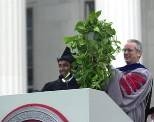Despite the fears and heightened security that the Sept. 11 attacks engendered, "this is a time to sustain opportunity and openness," President Charles M. Vest told the Class of 2002.
Since the graduating seniors arrived at MIT, "the end of science was proclaimed; the Internet bubble burst; and we suffered a national trauma at the hands of murderous terrorists. Yet despite these predictions and these realities, this is a time to sustain opportunity and openness. Despite the current problems in the world, I believe this is a time for optimism."
John Horgan's predictions in his 1996 book "The End of Science: Facing the Limits of Knowledge in the Twilight of the Scientific Age" have not come to pass, Vest said. "I firmly believe that we are entering the most exciting era in science and technology in human history. Science is not ending. It is evolving. It is being transformed. Many boundaries between science and engineering are melting away in the face of rich new combinations of knowledge and tools. This is a time when life sciences are looking once again at the questions of the whole, at how things work at a systems level. It is a time when the physical, biological and chemical sciences are joining forces with information sciences and technology."
In the coming years, scientists and engineers working together will continue to make great strides in areas including nanotechnology, computing and understanding the human brain, he said. "It is a time when information technology will become even more pervasive, but it also will become more human-centered and simple to use. And with these new blends of science and technology, this is a time when we will make extraordinary advances against human diseases, including those of the mind and emotions."
The Sept. 11 terrorist attacks "challenged our very concepts of citizenship, civil liberties and openness," Vest said. MIT and America "have benefited from being open to people from other countries. I think how fortunate we are to spend our lives in an institution that is based on meritocracy." He noted that recent MIT Nobelists and Institute Professors come from many different countries.
"Those who have come from around the world to study here have contributed mightily to our society and to our institutions. Many have stayed and built our nation. Some have returned to the land of their birth, taking with them knowledge and skills learned here. They also have taken with them a better understanding of what is good in this country ... And all have contributed to the quality of learning and experience of their fellow students that comes from campus diversity in all its dimensions.
"As we in this country strive to make all who live here safe from those who would harm us, we should not let our fear close the door to our own opportunity. Let us recognize the cost to future generations if we were to become too zealous in tightening access to our colleges and universities," Vest said.
"One of the terrible realities of these times is that our openness and our technologies have been turned against us. But we must not react by casting aside the very freedoms and openness that define what is good in America. Opening our great research universities to the very best students and scholars in the world is one of our best tools for spreading democracy, knowledge and human understanding throughout the world."
In his charge to the graduates, Vest said, "Take your education, your talent and your energy, and build us a nation and a world community that consider knowledge a gift to be shared, a healthy planet a place to be cherished, and human dignity and opportunity fundamental conditions to be enjoyed by all people."
A version of this article appeared in MIT Tech Talk on June 12, 2002.






